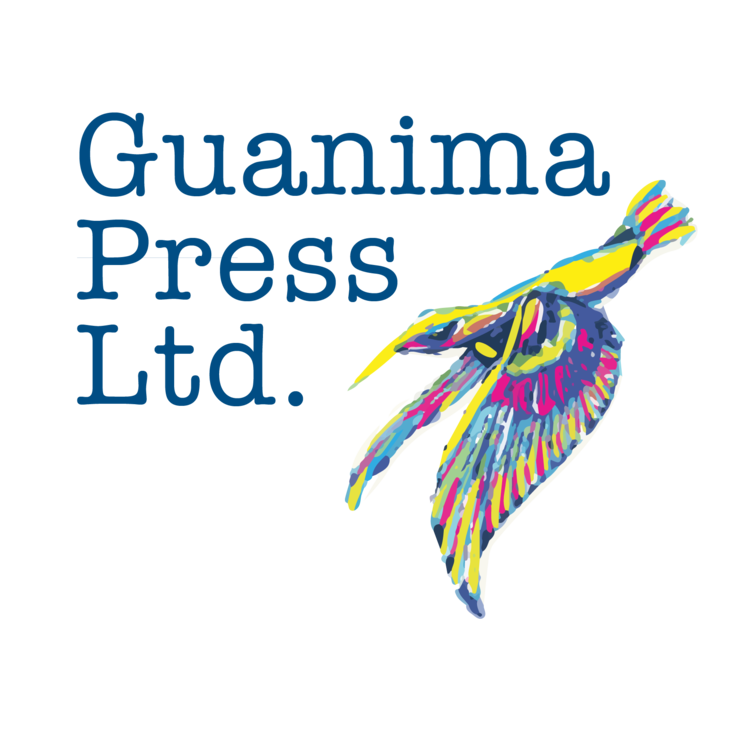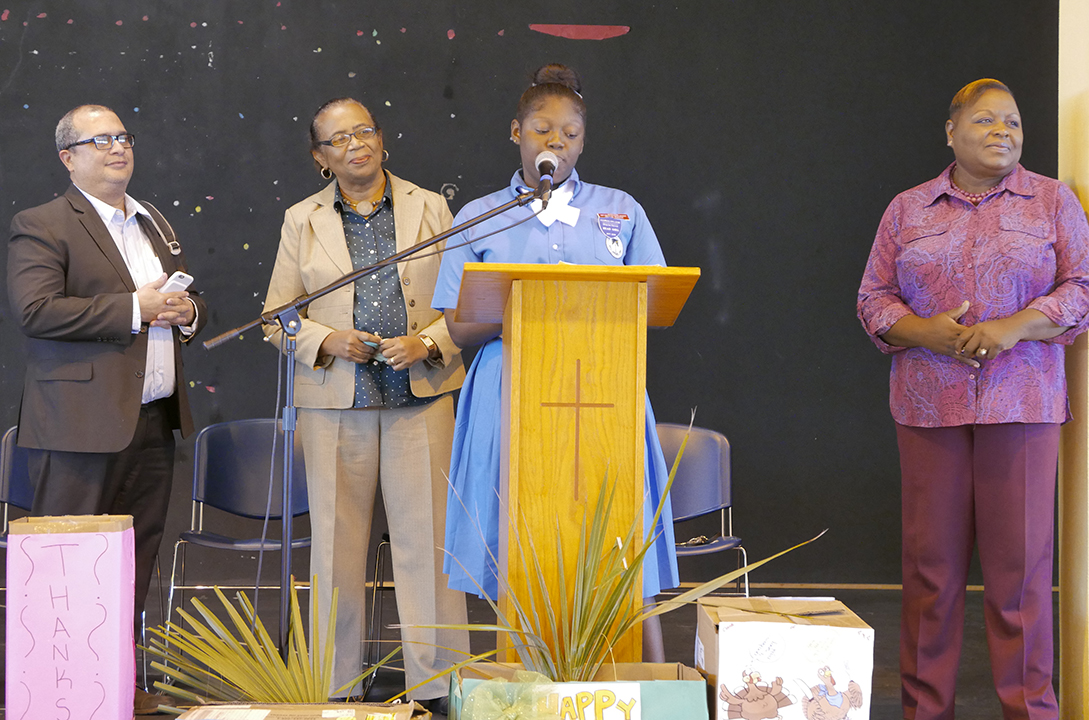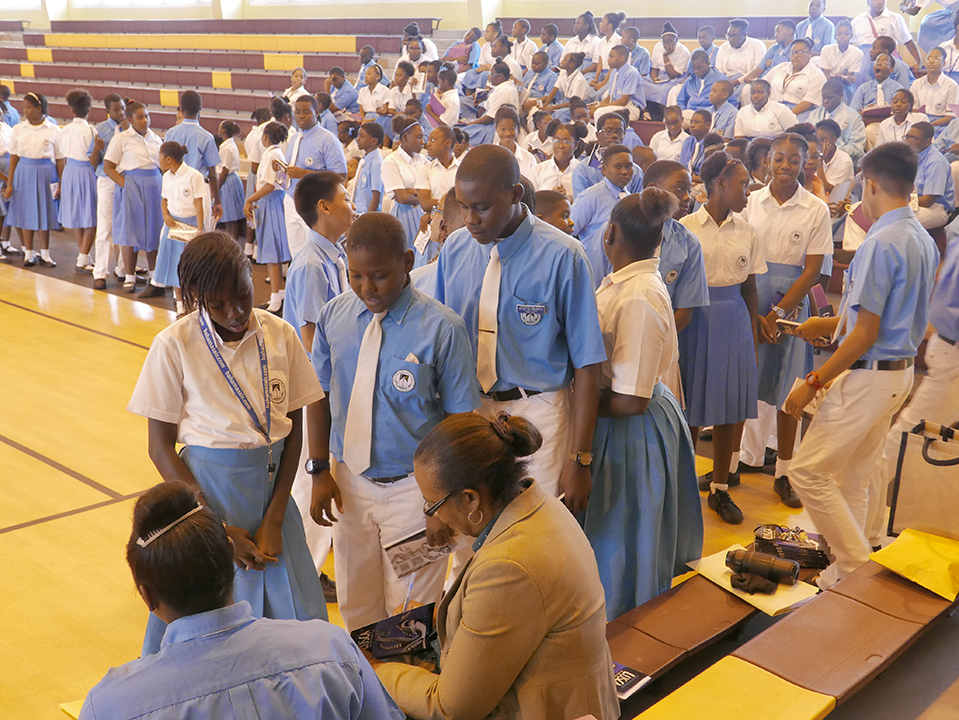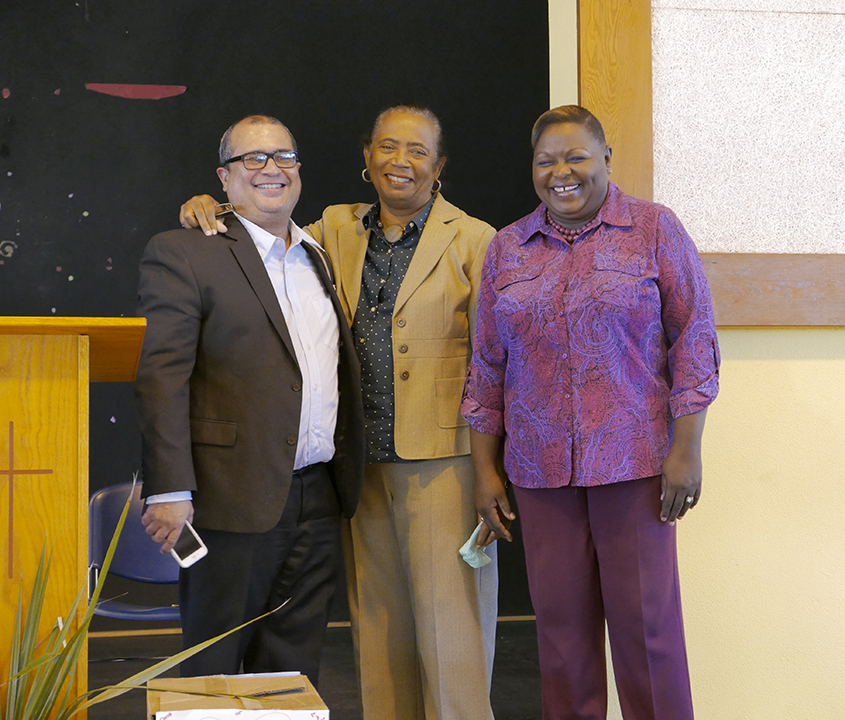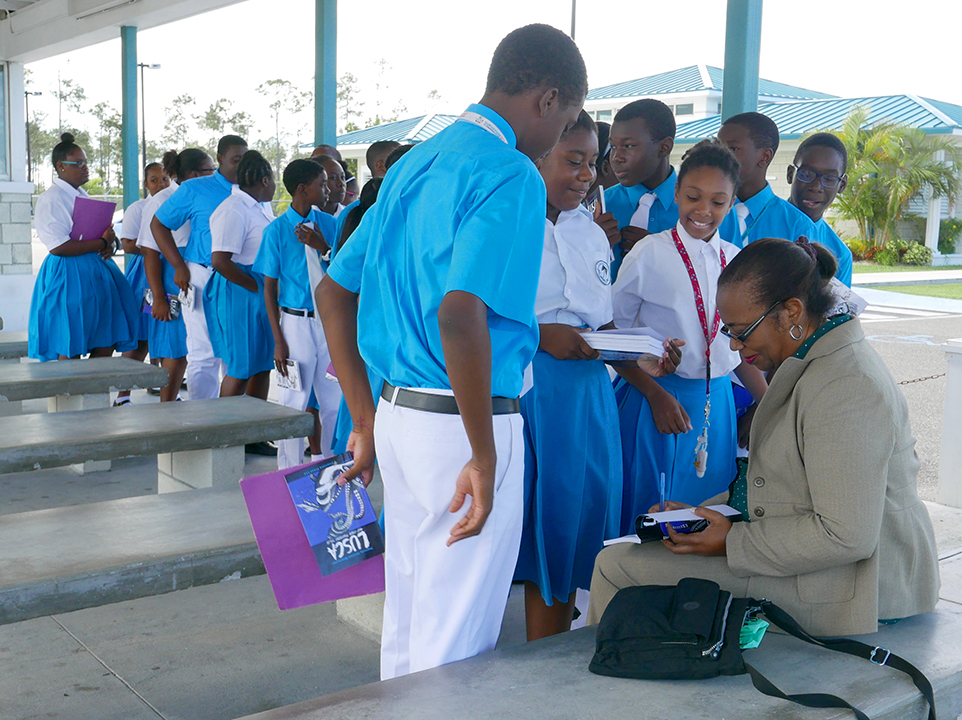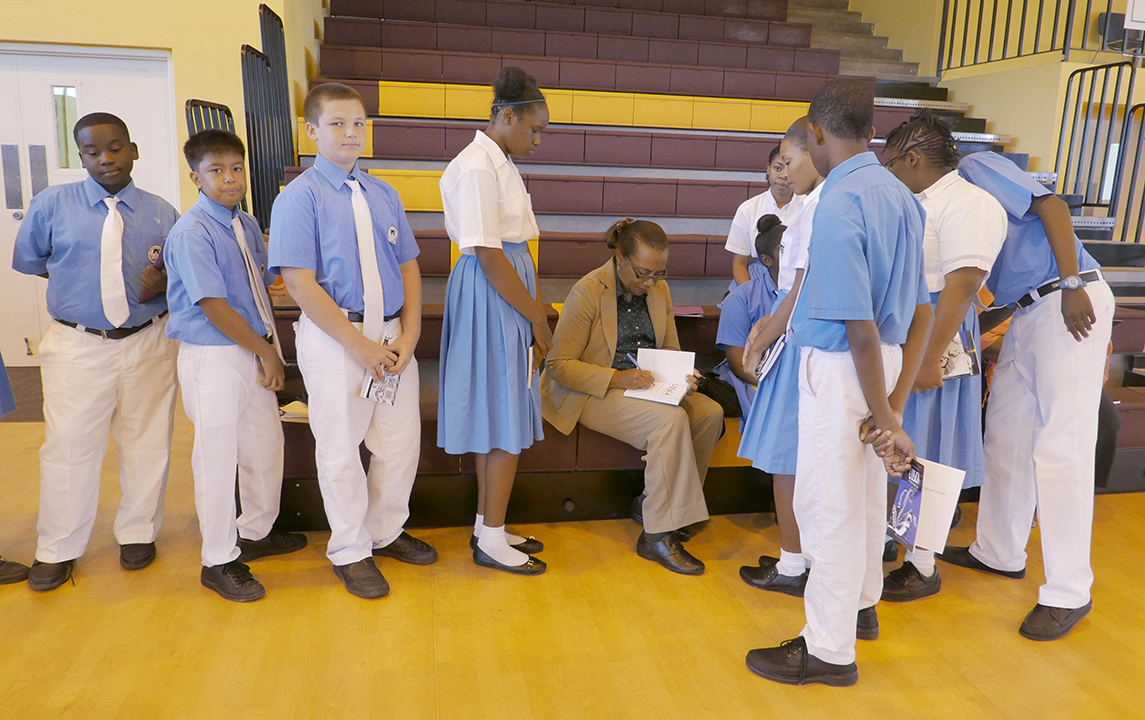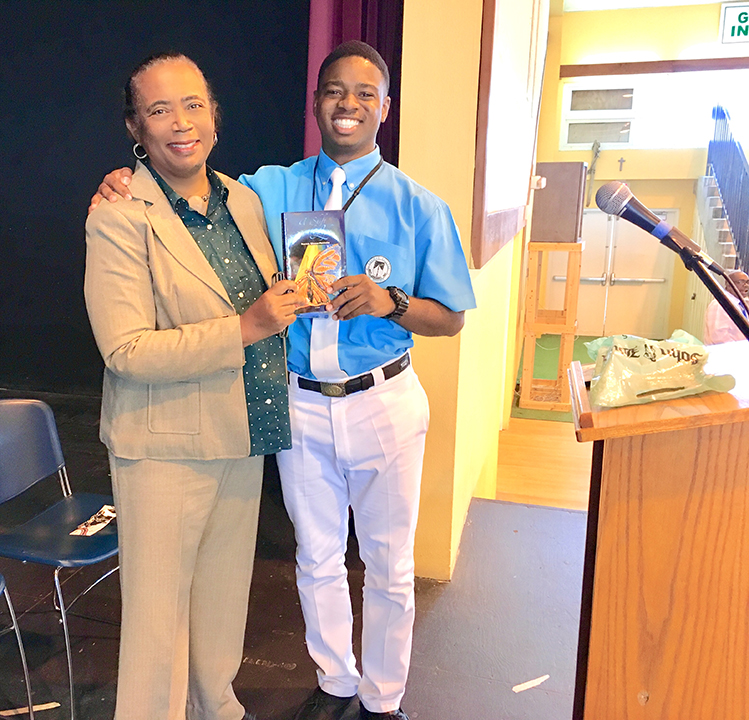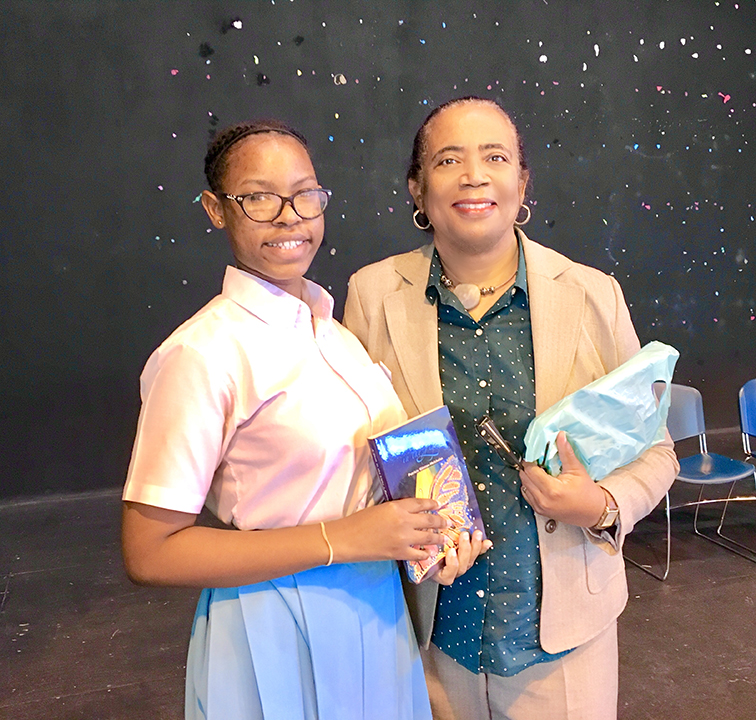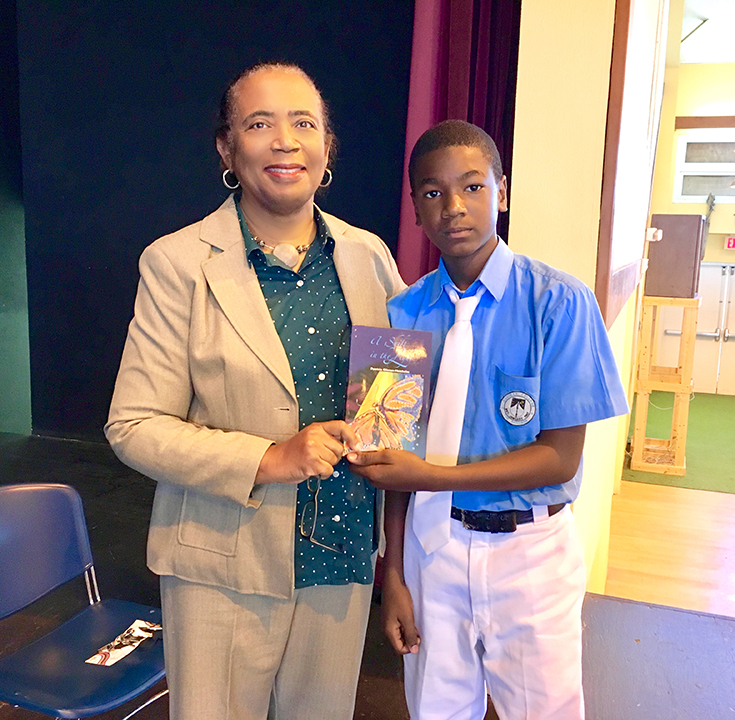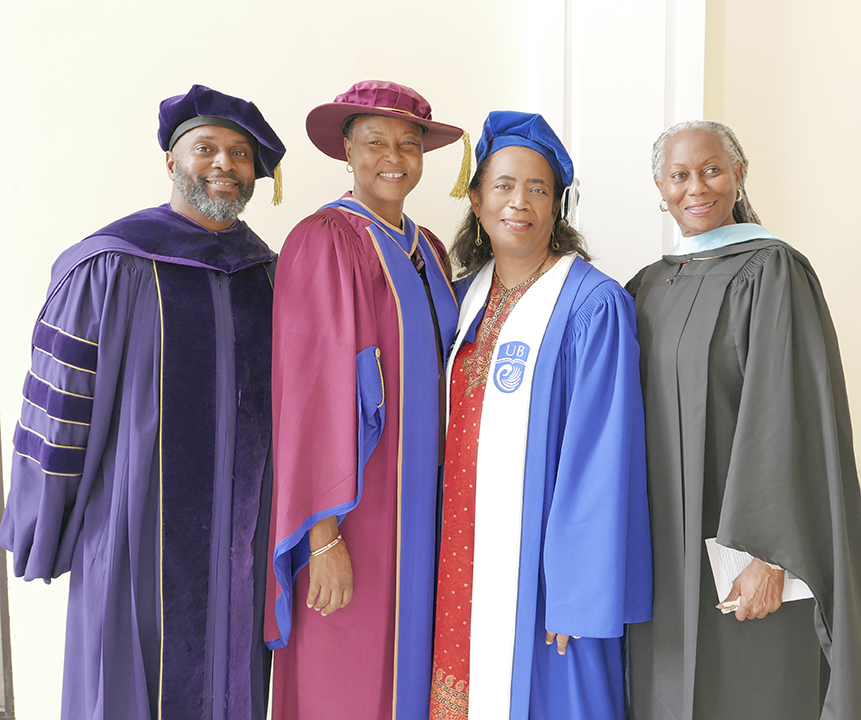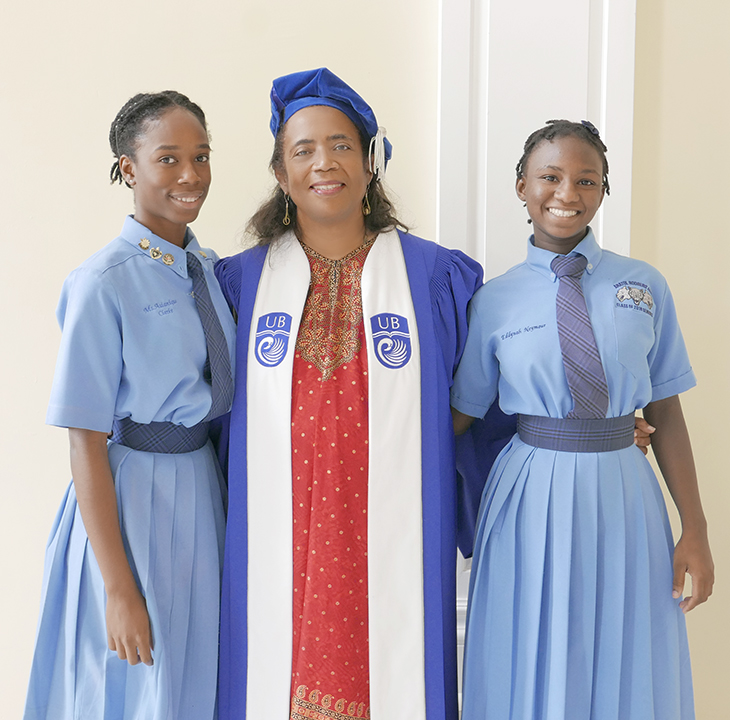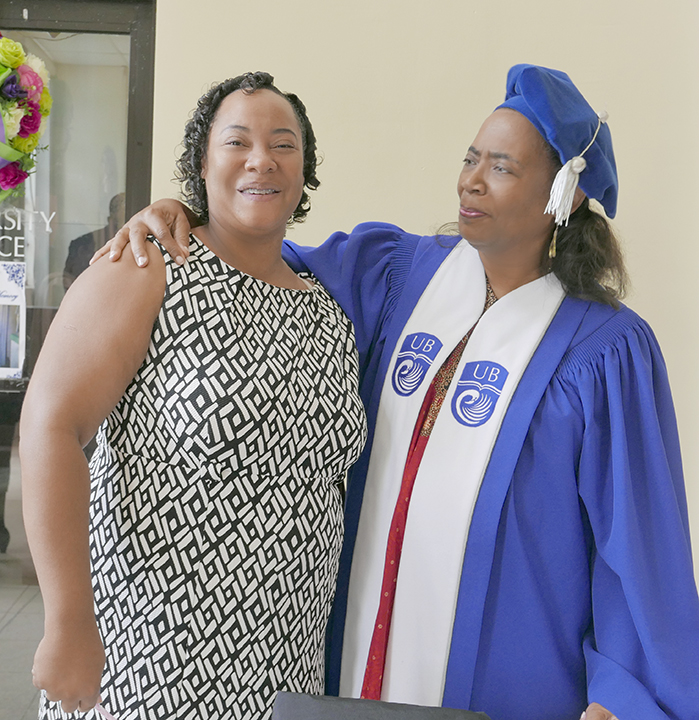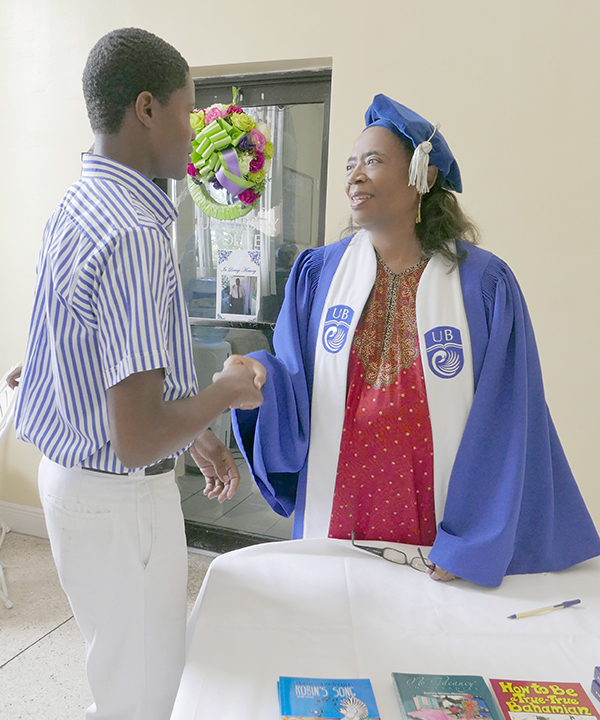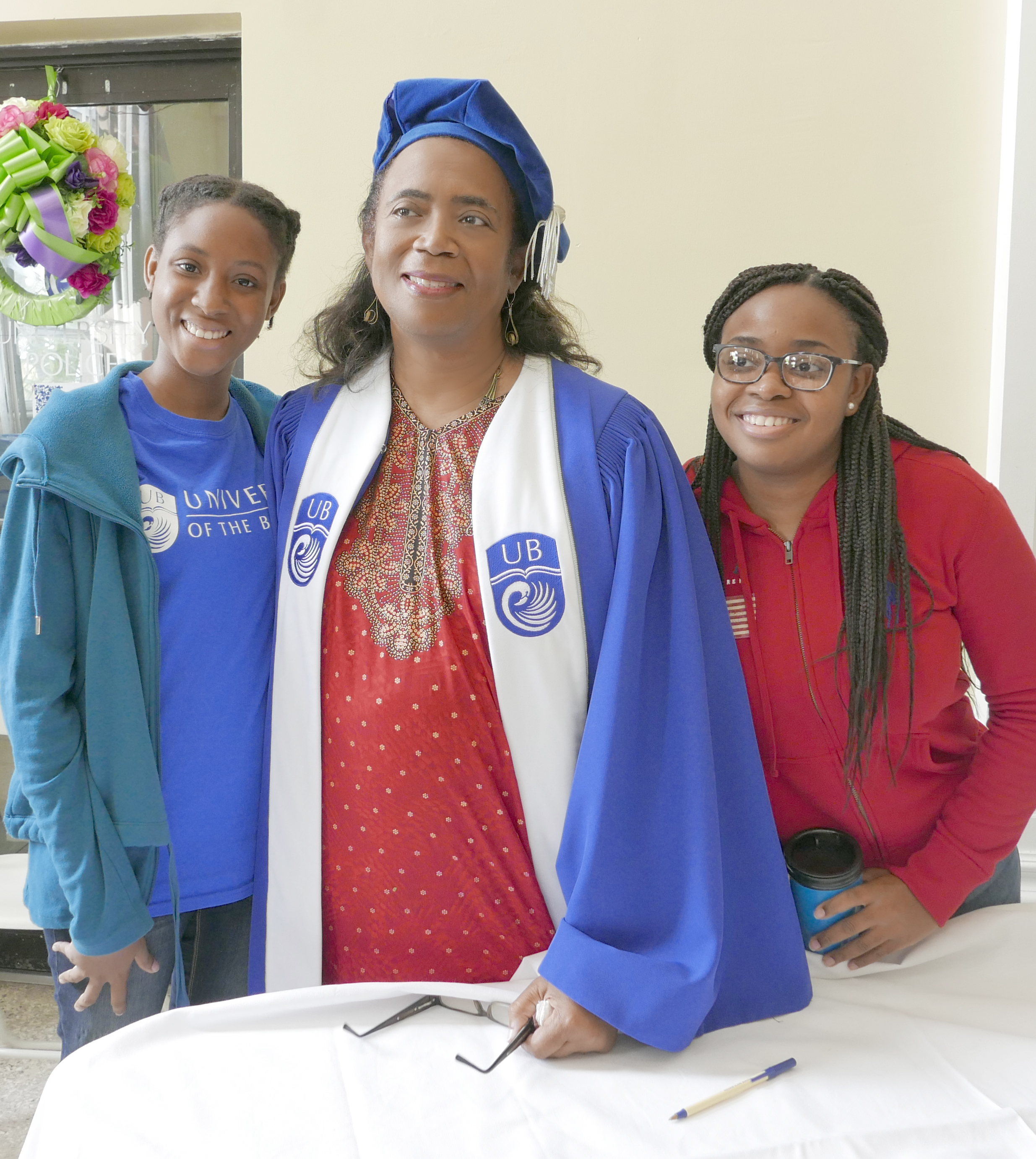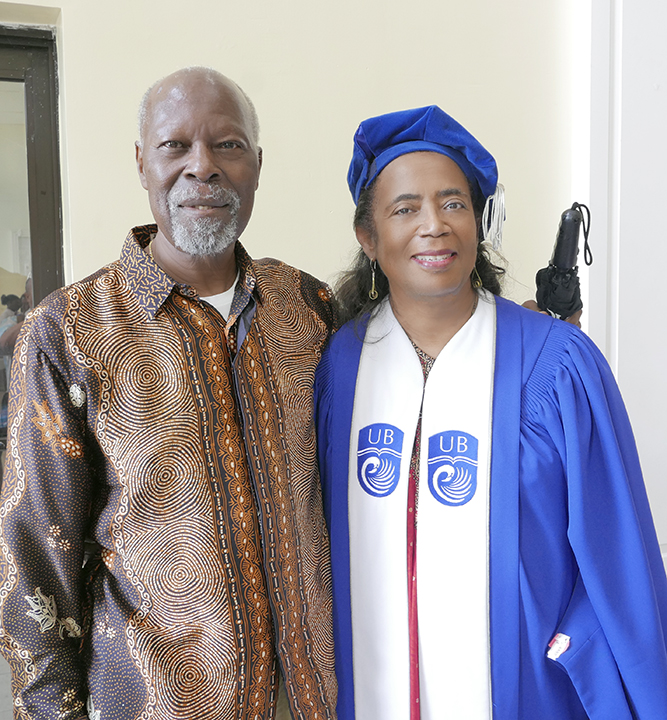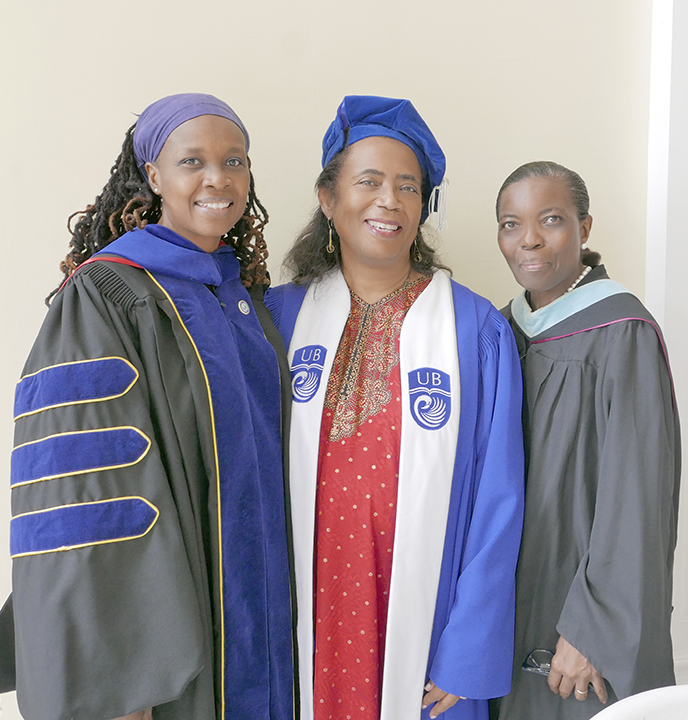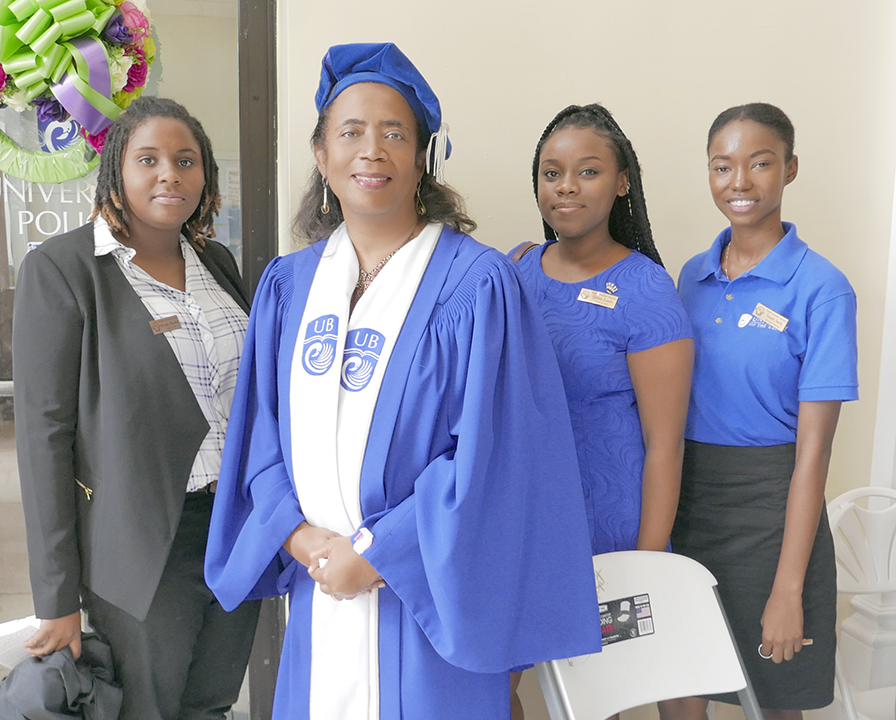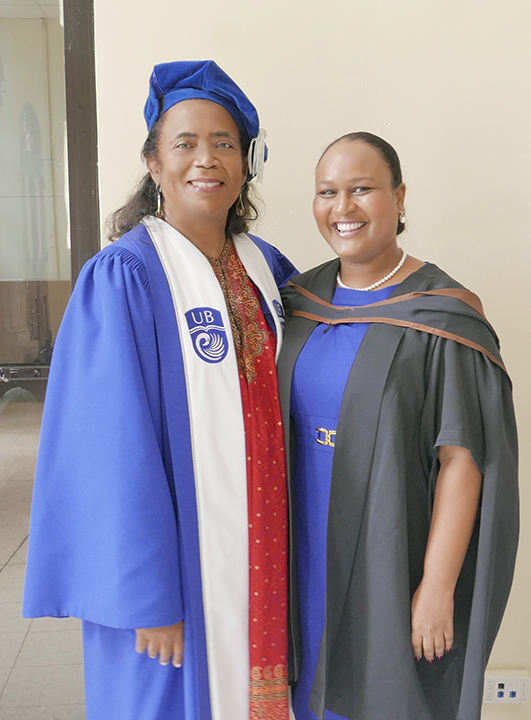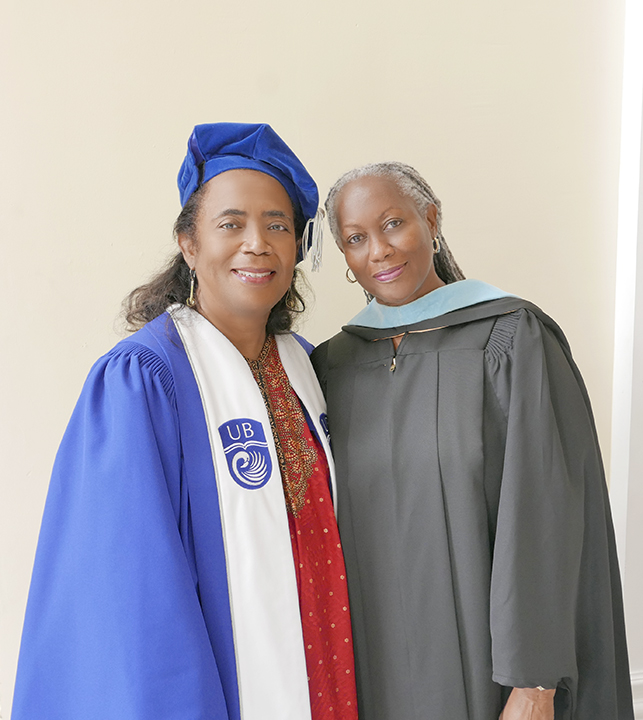Patricia Glinton-Meicholas
Tragedy and Triumph: The Roots and Legacies of Transatlantic Slave Trade
Patricia Glinton-Meicholas
The transatlantic slave trade (TST) took root in fertile soil—age-old competition among European states for supremacy, coupled with greed on both sides of the Atlantic. Add the exposure of the wealth of the New World by Christopher Columbus and the conquistadors who followed him. In a corrosive circular intersection, new technologies opened the industrial revolution, bringing unprecedented production efficiency, which eventually birthed rabid consumerism. This fermentation needed one more thing—cheap, ununionized labour. West Africa became the unregulated labour mill and the slave trade added rocket fuel to the industrial revolution.
“It was just good business,” some might say of the slave trade with some justification. Covering four continents and the islands termed ‘Caribbean’, the operations of the enterprise bore many of the hallmarks of today’s multinational companies. Raw materials grown, mined and initially processed in New World colonies were sent to European factories to be turned into finished goods and sold worldwide.
Financiers in The Netherlands bankrolled sugar plantations and the majority of the ships engaged in the trade. Underwriters insured against losses of ships and slaves. Speaking in 2020 of the “systematic and structural racism that has existed in many aspects of society”, the Lloyd’s of London insurance market apologized for its “shameful” role in the Atlantic slave trade.
The slave trade had its CEOs, including certain governors of the Bank of England and those of Britain’s Royal African Company, the first of whom was the future King James II. Royalty, nobles, shipowners, bankers and plantation and factory owners held the preferred shares. Queen Elizabeth I invested in John Hawkins first slaving voyage in 1562. Others profiting were ship outfitters, ship captains, Africans who controlled the interior and factors stationed at the dreaded slave-holding ‘castles’ on the West African coast.
There was franchising. By the Asiento de Negros, the Spanish Crown gave merchants of various nationalities the right to supply Spanish colonies in the Americas with slaves. The Royal African Company offered a seven-year trading deal at a £1,000 a year.
There were corporate takeovers: In 1634 the Dutch wrested Brazil from the Portuguese and became active players in slave trade.
The Atlantean Slave Trade was above all exploitative foreign direct investment, generating wealth for Europe and long-term debilitation of the societies, cultures and economies of sub-Saharan Africa and the New World.
The enterprise was a tragedy that had a 350-year run. The Portuguese rang the opening bell with the first shipment of enslaved from Africa to the New World in 1525. Eventually, approximately 12 million Africans would be transported, tightly packed in filthy cargo holds to maximize profits. Full fathom five lie the bones of 2.5 million, strewn across the infamous Middle Passage. Millions more would suffer as ununionized, brutalized labour, their bondage cemented by slave laws and violence.
The infernal drama rested on commodification and systematic dehumanization of human beings—branding, pricing and exposure on auction blocks to be examined like livestock. Evaluated by medical pseudoscience, such as phrenology, and socially defined criteria—language, mores and behaviour based on European models, Africans were deemed to be uncivilized and incapable of higher reasoning.
So as not to ruffle Europe’ putative Christian sensibilities, misinformation was spread on broadsheets and piously hymned—Africans were being rescued from heathenism. To encourage acceptance and passivity, religionists offered displaced Africans a blessed, new homeland called ‘Zion’.
The second act, centuries long, brought suppression of identity and cultural divorce—Physical removal from homeland, ethnic group and family accompanied by rape of language, religion, names and rights to parenting and family leadership. Africans became Neptunes and Bacchuses, Ciceros and Catos, fictive Greek and Roman gods and aristocrats without power or privilege.
Skin colour, hair texture, nose and eye shapes are environmental tropes, evolved to fit humankind to dominate the globe. Yet, the need to justify African enslavement converted nature’s gift into an impediment to advancement for Africa’s children. A value scale and terminology based on colour gradations determined a slave’s degree of humanity, while conferring white dominance. Forced breeding and deconstruction of the nuclear family, denial of education and the banishment of black achievement from history books falsely validated the fabrications of inferiority.
Today, we celebrate the triumph of the human spirit and the forced African imports’ struggle for freedom, self-definition and an equitable place at the table of humankind. In The Bahamas, this dynamic was manifested by
Various forms of resistance to slavery—Running away, malingering and revolt, inadequately armed
Formation of new lines of kinship
Linguistic bridging for mutual intelligibility via the creation of a creole.
Collective action for fraternal associations and community progress through lodges, asues for encouraging saving and sharing of labour in planting and harvesting.
Importantly, the enslaved preserved many African cultural artefacts: Folklore, storytelling, junkanoo, straw weaving and basketry, foodways and architectural wisdom, creating, over time, unique Bahamian forms reflective of evolving realities in an archipelago. Similarly, Bahamian blacks became master mariners, dominating the beautiful but challenging oceanscape of The Bahamas.
Adaptability helped the Bahamian enslaved to survive and excel against the seemingly the insuperable odds of generations of bondage. This scenario played out across the Caribbean region. While the resultant cultures show much evidence of kinship with the Africa and her Atlantic diaspora, they are each distinct.
We also celebrate the abolitionists who insisted on the brotherhood of humankind. Nevertheless, to the shame of humanity, the lie of racial inferiority, carefully woven by enslavement and its kin continues to wreak havoc on inter and intra-racial harmony across the black Atlantic world, in the former slaveholding European states and beyond. Asia has a $7.5 billion skin whitening market.
Sadly, in 2021, we are forced to acknowledge intransigent racism increasing globally. All is far from well in the United Kingdom, once the leading player in the Atlantic slave trade. The SHF Report reveals that, after several decades of initiatives, inequalities persist but many are now dismissing racism as some kind of distemper on the part of those who claim it. Anti-racism activist Nova Reid has claimed, “We have an unhealthy culture in the UK that calling out racism is more offensive than racism itself.”
Lending credence to Reid’s statement, British Prime Minister Boris Johnson has claimed that there are those who wish to “photo shop” British cultural landscape. British actor Laurence Fox, founder of the Reclaim Party, has said that ‘People need immunity from the virus of wokery’.
In the United States, pluribus has not become unum. Dangerously active, right-leaning groups are fomenting hatred of minorities, using guns and bullets to underscore the seriousness of their intent to create an all-white America, as underscored by the raid on the US Capitol. A CNN report noted:
Federal authorities are piecing together a chilling picture of the 6 January 2021 insurrection that reveals major security and intelligence failures, underscores profound fissures in American society and hints at the political challenges ahead. (Nicolette Gaoutte. 16 January 2021. https://edition.cnn.com/2021/01/16/politics/insurrection-investigation-washington-lockdown/index.html)
In 2019, the New York Times reported 1000 such factions. According to the Southern Poverty Law Centre, this alarming rise is owed to “a toxic combination of political polarization, anti-immigrant sentiment and technologies that help spread propaganda online. The same article noted the Anti-Defamation League’s report of a surge of right-wing violence that killed at least 50 people in 2018.
Racial profiling continues to spread its insidious web in the economic, political and social realm, denying job promotions, equitable housing, adequate access to quality health care and financing for business development. More fearful still, it stokes police brutality against people of colour. Consider the killing of George Floyd as well as the random mass shootings of Asians in March 2021.
Just as concerning, history has marked the rise of colorism: intra-race hierarchies and prejudices, out of which has sprung the politics of blackness. Africa-descended activists engage internecine warfare. As self-appointed arbiters of racial citizenship, they judge fitness to belong by degree of adherence to African religions, dress and hair treatment, while repudiating ‘mixedness’. Does this not suggest that European genetic and cultural inputs are pollutants? Is this not another brand of racism? How can one erase Europe without fracturing self and our multicoloured and multitextured families, which prevail across the region? Do we stop using English or do we ditch Christ in favour of Papa Legba and to what avail? It is not our very conch-salad-ness, our genetic and experiential concrete, which has built the nation?
Wouldn’t justice and equal rights be better served by developing our education and skill-building systems, so that more of our people know that we have much of which to be proud and can achieve undeniable competence on a global scale?
Let us begin by teaching our children that inferiority in not inborn. Tell them about peoples of African descent who have achieved excellence in fields where bigotry and planned exclusion said Africa’s offspring could not advance for lack of higher reasoning. Let our youth know that Mary Jackson, Katherine Johnson and Dorothy Vaughan, NASA’s human computers have not been the only mathematically and scientifically gifted African-American women and men. There were Evelyn Granville Boyd, Marie Maynard Daly, Carolyn Parker and Marguerite Williams as well as George Washington Carver, Edward Alexander Bouchet, Walter Lincoln Hawkins, Emmet Chapelle and Neil deGrasse Tyson, who have defied the racist dicta.
Then there are the Bahamian “hidden figures”. These limestone rocks of ours have nurtured many gifted men and women, who have excelled across the range of human intellect and endeavour.
We must do more to stop this brutish carnival of rupture and death that is humanity’s tragedy. We must top the hypocrisy of denial and covert apartheid. High on our awareness and action agenda must be truth and acknowledgement of our personal biases. Let us call out micro aggressions among family, friends and colleagues and the macros of bigotry that erupt in election season.
Black Lives Matter—All lives matter. All can contribute to effecting greater interpersonal and transnational concord to save our distressed planet. We must care about the ethnic cleansing that has put the Rohingya of Myanmar in danger of genocide. We must care about the widespread economic and political instability that causes nationals of countries worldwide who engage dangerous journeys to flee their homelands. We must own all our parts, all our colours, all our heritages and the kinship of all human beings.
Swedish singer Isak Danielson’s 2021 song “I Can’t Lose You” points out hauntingly humanity’s immutable chain of being:
I don't know what it's like to be fighting for my life
But if you do, I'll be fighting too
When you're feeling weak, I'll be the words if you can't speak
And if you lose, I'll be losing too
And I can't lose you.
References
Faulconbridge, Guy and Kate Holton Update: Lloyd’s of London Apologizes for Its ‘Shameful’ Role in Atlantic Slave Trade.
By Guy Faulconbridge and Kate Holton | June 18, 2020 https://www.insurancejournal.com/news/international/2020/06/18/
Stack, Liam. Over 1,000 Hate Groups Are Now Active in United States, Civil Rights Group Says. Feb. 20, 2019
https://edition.cnn.com/interactive/2020/06/europe/britain-racism-cnn-poll-gbr-intl/
PATRICIA GLINTON-MEICHOLAS || Bahamian author and cultural critic
https://www.guanimacreative.com/bio
A Call for Deeper Awareness and Action in the Face of Corrosive Discrimination
We must recognize and stamp them out, especially the elders of the clan: Xenophobia, Homophobia, Religious Zealotry, Gender Bias, Classism, Jingoism, which segue so easily into riffs of destruction.
Read MoreReacting to Cargo
By Neko Meicholas
Why does it always seem that everything I do starts with me not wanting to be bothered?
Have I gotten that old?
Have I become that miserable?
As usual, the evening started with me having promised to do something and no longer wanting to do it. Only two things kept me moving forward; I had made a promise to my niece to go and she had already spent her money. Too, I had wanted to support the efforts of another Bahamian artist…something I always try to do.
As I had missed the premier of the movie at Atlantis because of a total screwup in our scheduling I felt I was obligated to get my tired, overburdened tokhes (tuckus? Whatever!) up and go and support Kareem Mortimer’s latest effort and I’m glad I did.
Although Cargo has its weak points, like several dialogue/script issues, problems with Bahamian dialect use and a few unconvincing actors who really need to hone their skills, Kareem’s production held my attention. He told a story and told it beautifully. Would I ever watch this movie again? Hell no! By the end of the movie my heart was broken and I was so intensely depressed I could not bear to voluntarily put myself through that level of emotional devastation again. Quite frankly, Kareem was too successful at achieving his goal and telling his story, and telling it excellently.
WELL DONE KAREEM!
There were several powerful scenes in the movie delivered by the two stand-out actors: Berneice (played by Persia White) has a meltdown at the dinner table and Mona (played by Sky Nicole Grey), the Jamaican caretaker, finds herself trapped in a terrible situation as a result of Kevin (played by Warren Brown), the main character’s terribleness and descent into complete depravity. These two women actually play the most tragic characters in the movie.
After the movie ended and I had given it more thought, I realized that, in Cargo, Kareem had paid homage to the film American Beauty that stars the now sadly disgraced Kevin Spacey. I will leave you, the viewer, to discover those bits on your own.
In Cargo, I truly appreciated that Kareem had gone after art. The beautiful opening scene with the wooden necklace/rosary floating languidly in the blue water with the sunlight dancing around which heralds the only positive moment that comes later in the movie; the little broke-down crap-ass piece of boat chugging, forward in an endless sea of blue heading toward an uncertain destiny; the grot and ugliness of Celianne’s (played by Gessica Geneus) home and the moment when Kevin is forced to clean his mother’s shit from the walls of her room are a few.
And… for those more prurient viewers out there YES this movie has more than enough “T”, “A” and “D” to keep you happy. I mean quite frankly and quite humorously locked in my mind is Celianne’s dark, rigid skyward-pointing nipples contrasted against her suspiciously proud breasts and the blue water… I wonder how these aspects were negotiated in the actors’ contracts? (Insert wicked grin here).
Like the movie Lord of the Rings with its too many endings, I feel that Mortimer could have done without the multiple endings of Cargo, especially, the pointless scene between the grandson and grandmother.
Would I recommend going to see Cargo to anyone?
HELL YES!!!
Kareem does a great job of telling a story that needed to be told and does a beautiful job of doing it…never mind a few hiccups.
#cargo #Bahamas #film #kareemmortimer #review #migration #immigration #Nassau #illegal immigration #Haitian #Kevin Spacey #American Beauty #review #movie #Patricia Glinton-Meicholas #Kareem J. Mortimer #plight #refugee #folklore #folktale #goodreads #books
Bahamian Author Patricia Glinton-Meicholas Gifts Two New Works to the University of The Bahamas

Shown in photograph (l to r) Bertha-Mae Walker, PhD, university librarian, University of The Bahamas; Neko Meicholas, publisher Guanima Press Ltd; Patricia Glinton-Meicholas and Linda Davis, PhD, provost, University of The Bahamas.
Read MorePATRICIA GLINTON-MEICHOLAS, GUANIMA PRESS LTD AND ITS SPONSORS GIFT MORE THAN 500 COPIES OF LUSCA AND OTHER FANTASTIC TALES TO THE STUDENTS OF AQUINAS COLLEGE
Presentation by Neko Meicholas
Guanima Press Ltd
to the Students of Aquinas College
Loyolla Hall
Gladstone Road, Nassau, Bahamas
November 15, 2017
With this book we have preserved a part of our Bahamian heritage that was being lost.
With my wife Patti’s words and my illustration and electronic graphics skills we have locked... in ink and paper... a small part of our rich and colourful folklore.
This book represents our hope for the positive reform of our people and our country.
I hope with all my heart that each and everyone of you will realize the importance of this gift and make an effort to read it.
Patti wrote this book for you.
The Guanima Press Books for Students project was born because we despaired at the BGCSE results we were seeing written about in the newspapers.
We believe that young Bahamians no longer read as much or as widely as they need, and this is contributing to academic underachievement.
We wanted to do something to help by encouraging the reading of good books.
We wanted you to know the importance of reading.
We wanted you to know how important it is to spend your whole life reading, learning, gathering information and knowledge from books and other sources.
We wanted to encourage you to use that information to craft yourself into the best version of you.
We wanted you to know that you are brilliant.
We wanted to give you this book that was created about Bahamian lore… for Bahamians…by Bahamians.
We knew our small publishing company Guanima Press Ltd could not afford to do this alone, so we went into the community and asked for support—support that was readily given by wonderful and generous people.
We thank our wonderful sponsors.
We especially thank a very special woman—Barbara Thompson.
We thank Orry J. Sands, Earla Bethel of Danbrad Ltd, The Charitable Arts Foundation, The Cable Bahamas Cares Foundation, Sir Franklyn and Lady Wilson, Dawn Davies and those sponsors who have chosen to remain anonymous.
My dream of gifting thousands of Patti’s new book Lusca and Other Fantastic Tales to Bahamian students has become a reality because of our efforts and the support of this stellar group of people.
Today we are giving every single one of you, all 500 plus of you here a copy of this book for FREE.
Please read LUSCA and Other Fantastic Tales.
Read lots of other books… Bahamian books, books from other countries.
Please just read copiously and experience the magic it will create in your school performance and your life.
"Demolish the Chains, Demythologize, Detribalize, Broach the Divide for True Self-Determination"
Presented at the University of The Bahamas Convocation
29 September 2017
© 2017 Patricia Glinton-Meicholas
I dedicate this talk to the honour and glory of God, and to Larry Smith, Telcine Turner-Rolle, P. Anthony White, and to all dedicated writers, whose monuments rise in the music of their words.
A convocation is, or should be, a thrilling time in the lives of those of you who have just matriculated into the University of The Bahamas. It is to you freshmen that I address my initial comments. No doubt there is more than a little apprehension as there tends to be at all beginnings. No doubt your career here will be marked by many and varied events, and will place greater demands than ever before on your intellect, time and fortitude. With the right frame of mind, your years of study can be a source of growth and joy.
If you feel any fear or hesitation, know that you are a branch of a people who have always dared where history and bigotry stood ready to repel their boldness. Let me share a little history. In 1818 Bahamian Robert Chrystie Ambrister fought with the Creek Indians to help them retain their tribal lands in Florida, when the forty-two-year old United States strove to dispossess them. [1] Twenty-eight-year old George Watkins left his job as a waiter at the Royal Victoria Hotel to join the 26th US Coloured Troops to support the Union cause in the American Civil War.
Bahamians white and black were the pioneers of South Florida and the Keys, especially Key West, which became known as the “Conch Republic” for its Bahamian connection. About one third of the signers of the incorporation documents of the City of Miami were Bahamians. Florida’s first millionaire was William Curry, a native of Green Turtle Cay who settled in Key West in the mid-1800s. Real estate developer Ebenezer W. F. Sturrup migrated from Harbour Island to Florida in 1888, and became Dade County’s first black millionaire.
You should know too that Dr Allan Glaisyer Minns, MRCS, LRCP, born in Inagua, was the first black man to become a mayor in Britain, when he was elected to that rank in Thetford, Norfolk in 1904.
One of this country’s greatest sons was Joseph Robert Love, physician, medical missionary, teacher, Episcopalian priest, social and political activist. Love was noted for his contribution to the field of human rights in Jamaica. In 1880, he became the first Bahamian, and first African-descended person to receive a medical degree from the University of Buffalo.
In 1933 Bahamian-born Dr Albert E. Forsythe, and his flying partner C. Alfred (Al) Anderson were the first non-white pilots to make a round-trip transcontinental flight. The pair were the first black pilots to cross an international border, when they flew from the United States to Montreal, Canada. They also made a flight round the Caribbean, landing on New Providence on the way. Dr Forsythe was featured in “Black Wings”, the 1982 Smithsonian Institution exhibition paying tribute to aviators of African descent who made aviation history.
I invite all students to think of your time at UB as an exciting voyage of discovery, possibly leading to your own extraordinary achievements. See UB as an opportunity to develop a six-pack of intellectual muscles, and as an open field where your creativity can fly free. Your university career can be a peerless interval in which to build friendships of a lifetime, and to turn your castles in the air into concrete reality. If you work to this end, your emergence from these hallowed precincts will be glorious. I use the word ‘hallowed’ expressly. I believe that the ability to learn, and all occasions to engage learning, are gifts from the Almighty, and so should be considered precious, and held as sacrosanct.
Mark you well—This new beginning is equally a time for sober reflection. You are actively engaged in designing your future life, engaging what could be a period of unrivalled achievement and self-determination. Protect your right to decide how you will use what valuable learnings and skills you acquire in these halls.
I beg you to read, read, read. Read widely, read the classics, read across disciplines, read Bahamian books. Read truer accounts of your Bahamian heritage. Someone once said you don't have to burn books to destroy a culture. Just get people to stop reading them.
Books can be the vehicle by which you cross the vast stretches of recorded time, permitting you access to the wisdom of the ages. What you learn from them can give depth to your understanding, and lend wings to your imagination. Wide reading is an unassailable route to world-class scholarship and mastery. Make reading a lifelong commitment. It is a necessary adjunct to lifelong learning, which, in turn, is essential for continued relevance.
I laud the University of the Bahamas for launching its Common Read programme today, and thank the Provost and her committee who lead the project for choosing my book An Evening in Guanima as first text. I celebrate all the new reading progammes that are springing up in response to the troubling under achievement in this area.
I laud my husband, Neko Meicholas, also for conceiving of his Guanima Press initiative aimed to place copies of my new book Lusca in the hands of thousands of students for free. My thanks to the corporate entities and individuals, especially one extraordinary Barbara, who have shown remarkable generosity. In support of the Common Read project Neko has made An Evening in Guanima available as an e-book in the major online bookstores for $2.99.
Students, as you read, study, and hopefully absorb, your mind will be freed of the chains of prejudice and myth. You will discover, as the poet John Donne did, that
No man is an island,
Entire of itself,
Every man is a piece of the continent,
A part of the main.
This is an enlightenment to be desired, to earnestly pursue. In refining your capacity for introspection and circumspection, you will come to see yourself as an indelible part of your family, of your community, of our country, of our region, of our world, and as kin to all humankind. You are a vital cog in all these wheels. If your actions and reactions in these interconnections are less than optimal, their functioning, their dynamism will be that much less. You will be the less, however imperceptible the gaps may be.
There is no question of dropping out or opting out. You matter; you have a role to play. Know too that you can only play your part with excellence, if you begin your journey of development and emotional, spiritual and social growth with your mind wide open to truth.
Today, there is a truth that should be apparent, and of deep consequence to all gathered here. The burning truth today is that our families, our neighbourhoods, our country, and, consequently, our ability to soar to glorious heights are hobbled by manacles of cultivated and celebrated ignorance, myth, tribalism, selfishness, greed and increasing violence.
One might say that “the measuring line of chaos, and the plumb line of desolation,”[2] have been dropped on our country, with particularly destructive effect on our capital, where the nation’s population is lethally concentrated.
We are enslaved by a system of miseducation, where true education is dissed, missed, seldom hitting necessary targets. In 2012 the then Minister of Education revealed that more than half of all government school students are awarded a leaving certificate, as opposed to the desirable high school diploma.[3]
In 2017 6,692 students sat the Bahamas General Certificate of Secondary Education. Of that number, only 521 examinees received at least a ‘C’ grade in the core subjects of English, mathematics and science.[4]
The results from the Bahamas Junior Certificate Examinations (BJC) are even more concerning. In 2017 12,120 young Bahamians were examined, but only 1,326 rang the bell in achieving a ‘C’ grade or better in the core subjects. [5]
These results tell us a fearsome tale—6,171 young Bahamians graduating from high school and 10,794 junior high school students—have failed to reach a standard, which would allow them to progress to higher education or, without favoritism, become the first choice of the more progressive employers.
The Chief School Attendance Officer has opined on two possible sources of the problem. “Social media has its pros and cons,” he said, “but one of them, we feel, is taking away from constructive learning." [6] He spoke also of the 59 percent of senior high school males were absent on a regular basis, with females presenting absentee problems at 41 percent. At the primary school level, the absenteeism rate was 52 percent for males and 48 percent for females. Unless this trend is arrested, it seems likely that the country’s future, dependent on the quality of the upcoming generation, could well be severely impacted.
Do I hear silent cries for bringing back street-prowling truant officers? Unfortunately, such officers would probably get shot in these times. When attacking intractable problems, such as poor attendance and scholastic achievement, it is necessary to strike not at the branches or symptoms, but at the roots, among which are toxic environments and toxic parenting fed heavily by ignorance, and the corrupt models offered by many who claim, or aspire to leadership.
Toxic homes tend to give rise to toxic offspring. Consequently, life in our urban areas has become an allegory for bondage, mayhem and palpable fear—Witness the daily mad race by many to get off the streets after dark to homes that appear to be extensions of the Department of Corrections with their iron grills, alarm systems and barbed fences.
In this year of our Lord 2017, Bahamians are hemmed in by graduates of the academies of vice and crime that Nassau’s impoverished quarters and our prison system have become. These are schools where the core subjects and areas of highest achievement are murder, rape, robbery and sundry and senseless violence.
A striking scriptural metaphor describes vividly our calamity, and equally our self-deception in the face of the attendant perils.
We have entered into a covenant with death, with the realm of the dead we have made an agreement. When an overwhelming scourge sweeps by, it cannot touch us, for we have made a lie our refuge and falsehood our hiding place. [7]
Given the upward spiral of murders and healthcare system iniquities, I think it’s clear that death has reneged, and trashed the deal. The weekly news bid fair to become a running obituary. What are crime-ridden neighbourhoods but a form of bondage for those imprisoned there for lack of the motivation and means to escape?
We all are further disenfranchised by a noxious socio-political milieu, which incubates, fertilizes and propagates prejudice, divisiveness, and arbitrary class distinctions and privileges. Partisan politics feed never-ending electioneering, while all too many religionists daily empanel God’s justice tribunal without the sanction of heaven, or the mitigating influence of love. They and the many disgruntled pundits without portfolio have done much to impede our ability to achieve consensus on critical national issues and humane ways to address them. Hypocrisy is rife, but shame is in short supply.
Many in The Bahamas have developed a twisted mythology of worthiness for acceptance to Bahamian status, or to be accorded basic human rights, which a true democracy should enshrine for all. The criteria mainly seek to exclude a group I call the “WHHO?”—Women, Bahamas-born persons of Haitian descent, homosexuals and others—the aged, the disabled and the incarcerated. Apparently, these are the creations of lesser, deaf gods of gumelemi and stone, unable to hear or requite their children’s cries for a place in the sun.
We demean and seek to discard compatriots who may have much to contribute to national development, but lack the credentials of our flawed system of assigning importance. In devastating contradiction, we construct worthiness based upon political affiliation, successful piracy, family name, and no less on owning I-Phones, name-brand clothing, expensive handbags and sports shoes, artfully torn jeans and Remi hair. It seems that we care more about how we decorate our bodies, than what we put in our heads. The combination of wealth and the ability to give patronage trumps all, however, and is supposed to pardon all sins in this deplorable hierarchy of value—no need for laudable content of character.
This increasingly narrow radius of identification has spawned an upsurge in insularity, and a concomitant shrinking of compassion, and a growing repudiation of the obligations of our common humanity. I was appalled at the outpouring of criticism in some quarters for our prime minister’s offer of help to our sister Dominica in her current, woeful plight. Is it that we have grown so arrogant and selfish that we have discarded our humanity or lostour ability to empathize with suffering?
How short have Bahamian memories become. Let me remind you. On October 12, 2016, in the aftermath of Hurricane Matthew, Roosevelt Skerrit, prime minister of Dominica, arrived in Nassau. He came to say that his country had donated $100,000 to The Bahamas relief efforts, and the money had already been transferred to our government’s account. Dominica had done the same for Haiti.
Now, our sister nation has fallen to her knees. Dominicans need all the help they can get. Sadly, in a pathetic attempt to make political capital, many have forgotten that gift. Matthew took no lives in The Bahamas; Dominica is grieving for the deaths of loved ones, and anguished over the numbers missing. Imagine the pain at the sight of utter devastation, and the fears for a future of severe privation. In 2016, the GDP of Dominica was 525.4 million, that of The Bahamas was 9,047 billion. I cry shame on those Bahamians who are demanding that we turn our backs. Ask yourselves—Why do we decry senseless crime, when we devote so little to cultivating reasoning, emotional maturity and kindness in our people?
More and more, not only are we losing that which distinguishes us from wild beasts, who know only the law of fang and claw, we are disregarding, selling off or throwing away the things that validate us a unique and supposedly Christian people. We have largely devalued our land, our history, our heritage, our culture. I have only to mention wild land giveaways, and the millions squandered on a Trinidad & Tobago-style carnival. Think how those millions could have advanced the university’s research and development—research into the quality of our water supplies, sustainable urban development, the health of our conch and grouper fisheries.
Abaconian John Hedden summed up several of our national identity cancers with pithy accuracy: "Our history is thrown away. Our culture is discarded. Our architecture is allowed to rot. Our intellect is on a flight to Miami. Our resourcefulness is all about scheming to bring it in cost-free." [8]
Furthermore, our potential for economic growth is significantly curtailed by a pathological and deeply ingrained impulse to spend money we do not have, and a taste for fraud and embezzlement.
If we are attacked by an uncomfortable flare-up of conscience, we calm it with the antacid of self-deception. Whether it be the purse-snatching street thug, or the decorous office worker stealing paper or cooking the employer’s books for overtime pay, or the public servant defrauding the public treasury, in indignant self-righteousness the wayward adopt the stance of victim. Then, there are the bold who claim theft and breaches of the public trust as the special privileges and courtesies divinely ordained for parliamentarians and others highly placed.
The Bahamian “big daddy” myth is an important adjunct to these poisonous philosophies. Adherents live their lives without restraint, making no effort to learn or acquire skills and certifications. Such men and women construct manhood and womanhood on sexual prowess, and having more children than they can afford, refusing any kind of fiscal discipline or self-help. Why? Because the myth decrees that ‘big daddy’, that is government, and the kind-hearted Bahamians, are obliged to and will pick of the tab.
There are even Bahamians who still believe in a fairy godmother. Could this have been the myth that has sanctioned wall-to-wall gaming houses, where the jobless and poor now spend hours waiting for the magic and their real lives to begin? By what social or economic metrics did our erstwhile leaders decide that it was reasonable to allow 12 to 14 web shops to spring up in Long Island with a population of just 3000?
Progress is yet further restrained by single-track thinking. A case in point is the outpouring of commentary on actions to be taken in the wake of the destruction Hurricane Irma rained upon Ragged Island and Acklins. Circulating is the potentially dangerous view that government should corral the people of the south into a single community per island, while islands like Ragged should be abandoned altogether. [9] Let me warn those who subscribe to this position; nature abhors a vacuum. There are hordes of tired, hungry masses waiting and willing to jump in to fill the void.
Year after year, this country continues to insist on putting all our economic eggs in the basket of a tourism industry created in the late 1940s and early 1950s, and shaped to appeal to the tastes of that war-weary era. Consequently, tourism marketing focused on and continues to tout the myth of a carefree paradise, long on partying and short of principles. We ignore the fact that today’s long stay tourists want to see beyond the myth, unearthing nuggets of authenticity. In the absence of any serious effort to teach Bahamian history, culture and civics in our schools, the myth has been absorbed as our reality. I laud the Minister of Education for his declared intent to correct this deficiency.
We cry for economic diversification, but steadfastly ignore any coherent, consistent promotion of the creative industries, to date paying little more than lip service in signing related international conventions without bringing them into force. What are the creative industries? They are 'those industries which have their origin in individual creativity, skill and talent and which have a potential for wealth and job creation through the generation and exploitation of intellectual property.' [10]
Touted in recent times as the ‘Orange Economy’, the creative industries embrace advertising, architecture, art, crafts, design, fashion, film, music, performing arts, publishing, research & development, software, toys and games, TV and radio broadcasting, and video games. The Orange Economy was forecast to be worth $4.3 trillion by 2011. In that year alone, exports of creative goods and services reached $646 billion.[11] Bahamians have a wealth of creative talent; should we not be actively promoting such economic endeavours that are likely to include more Bahamians as business owners and managers? If we are to engage the creative industries, it is essential that we strengthen and enforce copyright laws, which Bahamians breach with impunity.
Clearly, Bahamians at the zenith of mythmaking narcotize, bowdlerise, and exercise amazing feats of mental and physical prowess to sweep the inconvenient truths of our individual and corporate sins under a now bulging rug of invention. We jump frequently to convenient, but erroneous conclusions, jump on high horses, put foot in mouth, talk through two sides of our mouths, skirt difficult questions, and throw our arms wide open to receive the false promises of modern carpetbaggers, thus inheriting the many concrete white elephants that clutter landscapes throughout our chain of islands. And, if none of this vigorous exercise fails, we resort to blowing smoke up our fellow Bahamians nether regions. In short, we call things that are not, as if they were—not in faith, but in an attempt to cover realities, which prove unappetizing.
Unless all Bahamians of goodwill make commitments to real change, rather than to crafty public relations campaigns, our international credit rating will always be in danger of downgrade. More critical still—Without intelligent and innovative input, our communities, our archipelago, our nation will continue to decline.
The death of an eight-year old boy killed at home by a stray bullet should draw the line in the sand for everyone of conscience.[12] I deeply mourn his death, and that of an infant a short time before. These children have been cast into a sullen earth unready to receive bodies unseasoned by years of sin, grief and regret. I decry the violent, miscreant hands that flung them indiscriminately into early graves. Let us mourn not only with tears and recrimination, but with decisive, reparative action, extending the hope of salvation even to the perpetrators. Cry havoc, and let slip the dogs of war on murder, hatred and injustice. All of us—not just the police, not the courts and not the penal system.
It is imperative that students, academics, professionals across the economic spectrum and all Bahamians begin to confront and treat the defects born of our long history of bondage, mythmaking and cultivated dependency. Be warned—we must not seek remedies from self-interested physicians. All too often their cures come with absolute contraindications, where the risks are deadly and benefits few. When we surrender the fish nurseries and coastal protection that mangroves represent in exchange for a foreign-owned resort, that could be open today and shut down next week, is it a trade of equality? True self-determination, true freedom and independence require collaboration, not division, honest self-examination, not self-exoneration, self-reparation, not demanding that someone else pick up the tab for our foolishness.
Smash the chains.
Dare to pulverize the dictum that says we are too small a nation to make ground-breaking change. Repudiate the belief that we are a bargain-basement people, that we are a dependant people of minor intelligence, people who were left out of the Creator’s donation of genius.
Know that there is still an abundant potential to rise, founded upon a reinvigoration led by Bahamians who still believe in challenging the seemingly impossible. In the aftermath of Hurricane Irma, Prime Minister Hubert Minnis proposed that, with government and Ragged Islanders in partnership, Ragged Island could be made a green island offering a new brand of tourism. That’s possibility thinking.
Someone commenting under the pseudonym “ThisIsOurs” agreed, noting:
This island could be rebuilt in conjunction with the community to be self-sustaining and an economic contributor. It could be laid out beautifully and designed to maintain the rural island feel. They "could", if they're willing to listen, generate a new style tourism product the likes of which is nowhere else in the Bahamas, while at the same time servicing the needs of the community and providing safety in the face of future storms. [13]
This too is possibility thinking.
There is still hope. In every generation there have emerged Bahamians of genius, possessing daring and powers of invention in face of great odds. Consider the men and women who defied three centuries of exclusionary oligarchy. Consider the Bahamian suffragettes. I challenge you to model your ambitions, work ethic and creative on the Bahamians who have dared, time after time, to demolish the myths that hold us back from our upward climb.
In this context I cannot fail to mention the superb Bahamian visual artists, whose works are to be found in significant collections internationally, and the writers, who are award winners and published at home and abroad, as well as the growing band of creative entrepreneurs.
Significant is the number of Bahamian-born talents, or those of Bahamian descent who have graced international stages. If I name three, they have to be the great vaudevillian Egbert “Bert” Williams, Sidney Poitier first Bahamian and first African-American to win an Academy Award for Best Actor, and superstar Beyoncé, who has sold over 100 million records as a solo performer.
In impressive numbers are the long line of outstanding Bahamian sportsmen and athletes. I need not single them out. Their names and fame have become common currency in this country and internationally. In contrast, how much do we know or care to know about Bahamians who have broken the mould in thought, in math, science and engineering, and have gained significant recognition beyond home shores? I invite you to be inspired by this new generation of Bahamian stars shining brightly in the international intellectual firmament. I give you a small sample:
Alexander Cartwright, new chancellor for the University of Missouri’s Columbia campus and former provost and executive vice chancellor at the State University of New York (SUNY), a 64-campus system.
Aisha Bowe, aerospace engineer, is the first Bahamian woman to work at NASA, as well as the Co-Founder and CEO of STEMBoard.
Desiree Cox, Christian Campbell and Myron Rolle, our three Bahamian Rhodes Scholars. Dr Cox has been honoured by Oxford University as a thought leader in global health and education.
Robin Glinton, Vice President, Data Science Applications at Salesforce in San Francisco, the Fortune 500 company that is the world’s # 1 CRM platform, whose cloud-based applications for sales, service, and marketing power some of the world’s largest enterprises.
Stefan Moss, whose research on the freshwater turtles of the Tennessee River will be published in Chemosphere, a peer-reviewed scientific journal, published since 1972 by Elsevier of The Netherlands.
James J. Murray, astrophysicist and founder of BOOSTER Space Industries in 2006.
Kristie Powell, Senior Technical Account Manager at Google, Inc. in the New York area. Google, as you must know is a multinational technology company, which has revolutionized online search and advertising technologies.
And lastly, but certainly not least, Herbert Hugh Thompson, an Adjunct Professor in the Computer Science Department at Columbia University, and Chief Technology Officer at Symantec Inc., the world’s largest security software company.
I assure you, there are many more gifted Bahamians to be identified, celebrated and brought into the vanguard of The Bahamas’ fight against its growing disgrace. Note well that behind the high achievement in all such cases, there is a history of hard work, a relentless push to surpass one level of achievement after another, and learning every new development in the relevant field. Emulate this dedication.
Isn’t it time for these mental Olympians to be brought out of the shadows of our defective meritocracy, and into the sun of the nation’s praise? It is good news that the prime minister has set about identifying these valuable expatriates.
When will the steadfast, productive educators, historians, writers, researchers and scientists merit as much of our praise and reward as sports and entertainment stars? Where are the ministerial embraces, the generous gifts of money and land for those who help the world to realize that our intellect is world class? When will we celebrate the men and women who demonstrate that our culture is more than Junkanoo Carnival and ‘winin’ down’? Where are the hurrahs for our documentarians who record Bahamian history and life as more than partisan politics and an aristocracy built on wealth and chicanery? Isn’t it time we adjust to a more praiseworthy and inclusive value system and meritocracy?
I call on students, university faculty and administration, all thoughtful Bahamians and residents to join in demolishing the chains, discarding the destructive mythologies, bridging the societal divides, and turning back the present insidious red tide infecting the precious coral of Bahamian life. We have the ability, but the revolution demands no less than our best selves, and a drive that relentlessly targets mastery and excellence in all we do. In so striving, none will have any need to take recourse to the bluster and lies that are often raised to mask incompetence and failure.
I call on each student to become the newest Bahamians whom the world will laud. Refuse to continue diseased traditions, which infect the Bahamian socioeconomic climate. Disenthrall yourselves from any expressed views or actions that impinge on the basic rights of humanity—including the now well-entrenched Web practices of cyberbullying and doxing.
Strive for brother and sisterhood, and coalescence in worthy common causes. Let’s create a team of fearless architects dedicated to constructing a new Bahamas, one that engenders and cherishes a more harmonious relationship with nature, a country that holds inviolable the rights of all human beings, regardless of ethnicity, race, colour, creed, sexual orientation or disability.
Who among you students and professors will rise to the challenge? You should be though leaders, leaders in excellence and probity.
Who among you will seek the lofty heights of statesmen and women purposed to eradicate want, rather than following the time-honoured route of egomania as frequently demonstrated in our august parliament? Will you formulate new ways of teaching math, English and science to lift Bahamian students out of the doldrums of achievement in those subject areas? Are you satisfied with just buying Smartphones and making them a fifth limb, or will you invent an outstanding advance in telecommunications? Can we hope that you will devise social programmes to reduce the rates of recidivism in our crime statistics? Will any of you grace the research team that eradicates cancer, diabetes, sickle cell or HIV/AIDS? Will your names shine among Nobel laureates, or will you be added to the rosters of the contemptible bands, who fill our world with infamy and terror? I implore you all—let it be the former. I mourn the loss of potential that is short-circuited, imprisoned, and sent yearly to the grave.
Each of us has divinely implanted seeds of talent and genius. Will our portion lie ungerminated, or will we wake them up with your unrelenting labour in weeding, watering, fertilizing and pruning, undaunted by the brutal sun of disappointment, harsh and undeserved criticism or the malfeasance of others? Let us work hard, and make the necessary sacrifices! Henry Ford, the American inventor who revolutionized transportation, said it well--You can’t build a reputation on what you are going to do. I say just do it! At times you may fail, but you should never accept defeat, never stop reaching for the prize of a higher calling.
As Shakespeare’s Brutus enjoins Cassius in the play Julius Caesar:
There is a tide in the affairs of men.
Which, taken at the flood, leads on to fortune;
Omitted, all the voyage of their life
Is bound in shallows and in miseries.
On such a full sea are we now afloat,
And we must take the current when it serves,
Or lose our ventures. [14]
Now is the time, my people. Today, let’s agree to provision a voyage to greatness.
I close now with words that are engraved on a Washington, D.C. sculpture honouring Mary McLeod Bethune, African American civil rights administrator and educator:
I leave you love.
I leave you hope.
I leave you the challenge of developing confidence in one another.
I leave you a thirst for education.
I leave you a respect for the use of power.
I leave you faith.
I leave you racial dignity.
I leave you a desire to live harmoniously with your fellow men...”
[1] The United States vs Robert Chrystie Ambrister. Trial Fort St Marks, Fla, 28 April 1818.
[2] Is 34:11
[3] Virgil, Khrisna. “Silence Over Grade Average”, The Tribune, Wednesday, 8 August 2012.
[4] Jones, Royston Jr. “Exam Results Get Worse: Fewer C grades in math, English and science”, The Nassau Guardian Friday, 1 September 2017.
[5] Russell, Krishna. “Results expose failing schools”, The Tribune, 31 August 2017.
[6] Moss, Shavaughn. “Sobering Absenteeism Figures, The Nassau Guardian 11/09/17
[7] NIV Is. 28:15
[8] Smith, Larry. “Andrews University Publishes Proposal to Address Development Pressures on Abaco”, 12 January 2009. http://www.bahamapundit.com/2009/01/a-proposal-to-address-development-pressures-on-abaco.html. Accessed 25 September 2017.
[9] “Small Family Island Model ‘Unsustainable’”, The Tribune, Tuesday, September 12, 2017
[10] www.davidparrish.com/creative-industries/. Accessed 25 September 2017.
[11] Buitrago Restrepo, Pedro Felipe; Duque Márquez, Iván. 2013 The Orange Economy: An Infinite Opportunity, Publications IADB.org.
[12] Rolle, Rashad. “Eight-Year-Old Killed Doing Homework As Man Shot Dead”, The Tribune, 26 September 2017.
[13] Op. cit “Small Family Island Model ‘Unsustainable’”.
[14] Julius Caesar Act 4, scene 3, 218–224
